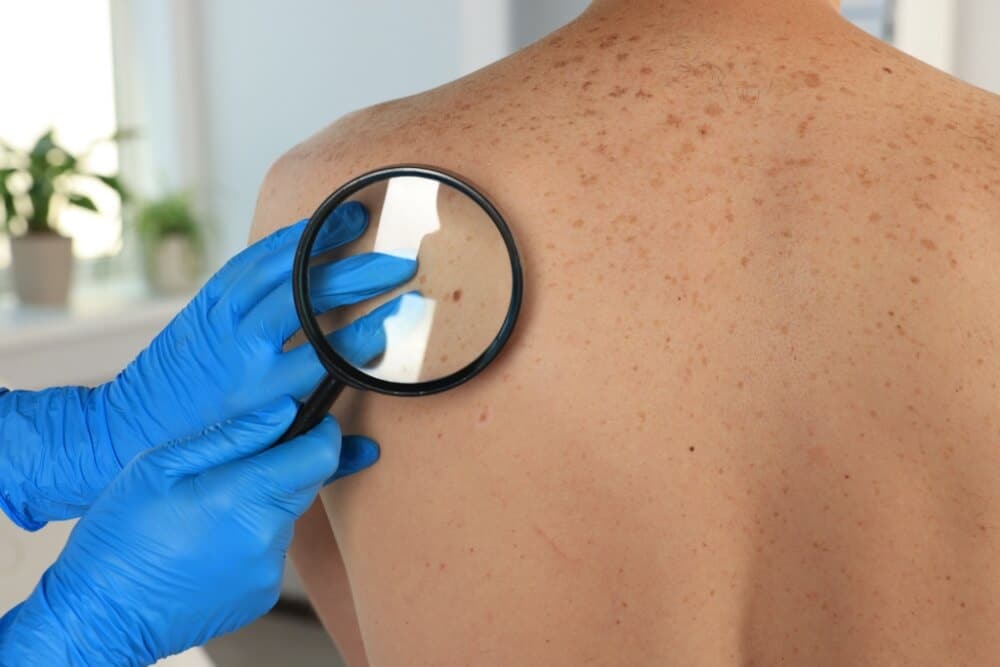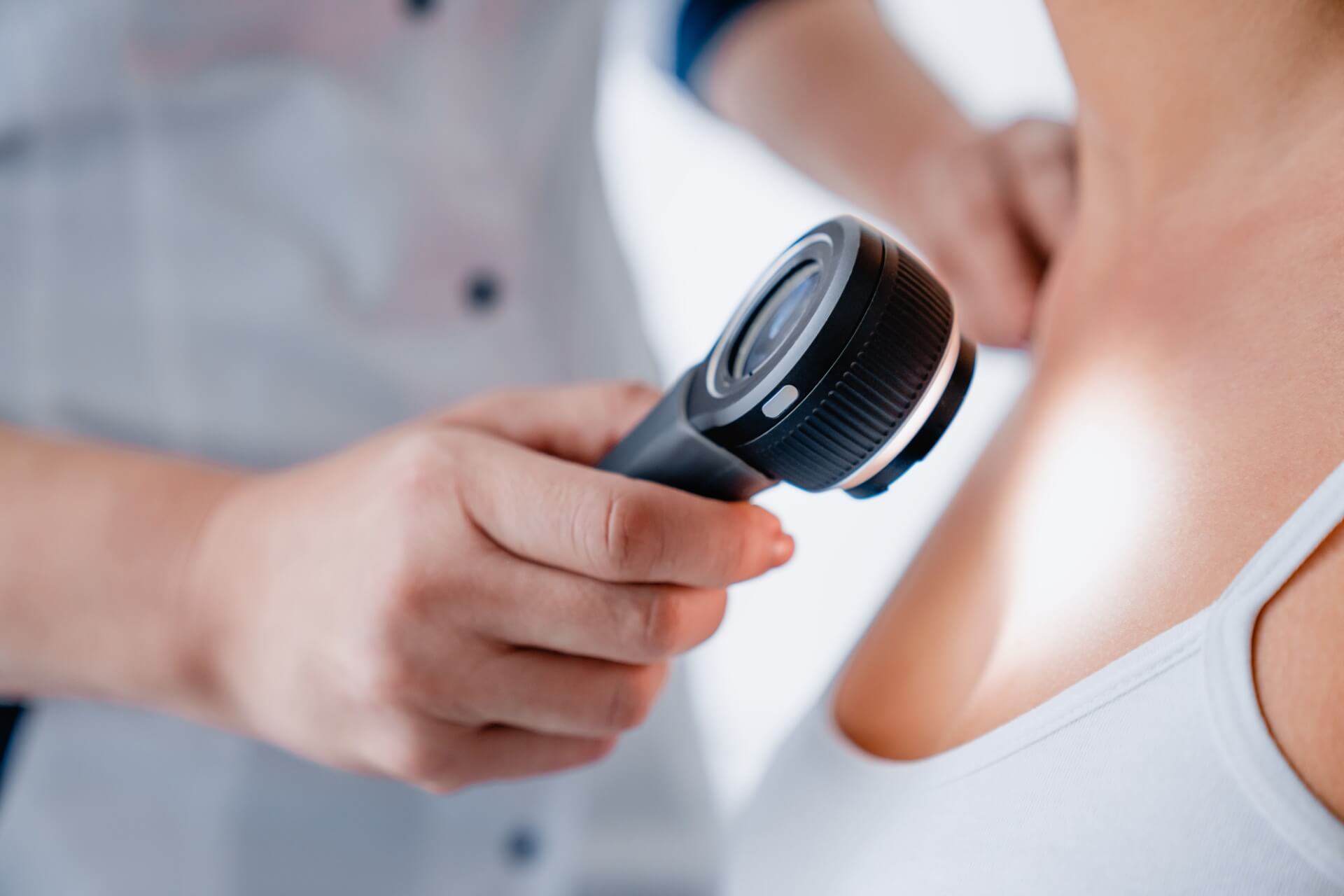Comprehensive Skin Cancer Exams by a Board-Certified Dermatologist
City Dermatology Skin Institute provides thorough and advanced skin cancer screenings, mole checks, and melanoma detection services for patients in Bensalem, Warminster, and surrounding Bucks County communities in Pennsylvania. Under the care of Dr. Imran Amir, MD, FAAD, a board-certified dermatologist, our practice emphasizes early detection, education, and personalized prevention strategies. With modern dermoscopy technology and a patient-centered approach, we help individuals identify skin cancer early, when treatment is most effective.
Why Skin Cancer Screenings Are Essential
Skin cancer is the most commonly diagnosed cancer in the United States, yet it is also highly treatable when discovered early. Annual full-body skin exams allow dermatologists to identify early signs of basal cell carcinoma, squamous cell carcinoma, and melanoma before they progress. Patients with a history of sunburns, tanning bed use, fair skin, numerous moles, or a family history of melanoma benefit especially from routine dermatologic evaluations. City Dermatology encourages every adult to make yearly skin cancer screenings part of their preventive health routine.

What to Expect During Your Skin Check
During your appointment, Dr. Amir examines the skin from head to toe, evaluating moles, freckles, sunspots, and lesions for any changes. Using dermoscopy, he can detect patterns and early abnormalities that are not visible to the naked eye. Each exam is tailored to your unique skin type, history, and level of risk. If a concerning spot is identified, Dr. Amir discusses whether a biopsy is recommended and explains the next steps clearly, ensuring patients understand their care plan and feel supported throughout the process.
Melanoma Detection and Expert Mole Evaluation
Melanoma can be life-threatening but is highly treatable when diagnosed early. Dr. Amir evaluates moles for changes in size, symmetry, color, borders, and growth patterns. Individuals with a personal or family history of melanoma, or significant sun exposure, receive detailed guidance on which changes to watch for and when to schedule additional screenings. Our approach prioritizes clarity, prevention, and ongoing support for long-term monitoring.
Proudly Serving Patients Across Bucks County Townships & Northeast Philadelphia
Bucks County
Bensalem, Bristol, Feasterville, Langhorne, Southampton, Levittown, Morrisville, Falls
Northeast Philadelphia
19154, 19114, 19115, 19116, 19136, 19152, 19111, 19149
Warminster Region
Warminster, Warrington, Warwick, Doylestown, Buckingham, Hatboro, Horsham, Abington, New Britain

Why Choose City Dermatology for Skin Cancer Care?
Patients trust City Dermatology for their skin cancer screenings because of Dr. Amir’s board-certified expertise, his detailed evaluation methods, and the practice’s commitment to early detection. With modern dermoscopy tools, individualized monitoring plans, and convenient locations in both Bensalem and Warminster, our team ensures patients receive accessible, precise, and compassionate care. Reach out to schedule an appointment.
FAQ: Skin Cancer & Melanoma Care
Most adults benefit from a yearly full-body exam, while individuals with higher risk factors may need more frequent visits based on the dermatologist’s recommendation.
Any mole or spot that changes in appearance, grows rapidly, develops an irregular border, or begins to itch or bleed should be evaluated promptly.
A standard skin exam is painless. If a biopsy is required, a small amount of local anesthetic ensures comfort throughout the procedure.
A routine screening usually takes between ten and twenty minutes, depending on your risk level and the number of moles.
Most patients do not need a referral. Our office can help verify your insurance requirements.
Yes. Skin cancer can occur in all skin tones and may appear in less sun-exposed areas, including palms, soles, and under the nails.
He will explain his findings and recommend the next appropriate step, which may include a simple biopsy performed with local numbing for your comfort.
References
- Garbe, C., Peris, K., Hauschild, A., Saiag, P., Middleton, M., Bastholt, L., … & Eggermont, A. M. (2016). Diagnosis and treatment of melanoma: European consensus-based interdisciplinary guideline–Update 2016. European Journal of Cancer, 63, 201-217.
- American Cancer Society. (2021). Skin cancer prevention and early detection. https://www.cancer.org/
- Watts, C. G., Madronio, C. M., Morton, R. L., Goumas, C., Armstrong, B. K., Curtin, A., & Mann, G. J. (2017). Diagnosis and outcomes of melanoma detected in private and public screening clinics. International Journal of Cancer, 140(2), 310-320.
Skin Specialists at City Dermatology Helping You Achieve Radiant, Healthy Skin
Skin cancer is the most common cancer worldwide, with basal cell carcinoma (BCC), squamous cell carcinoma (SCC), and melanoma being the main types. Early detection through regular skin checks is critical, as it can significantly improve outcomes and reduce morbidity associated with skin cancers. Skin checks allow for the identification of suspicious moles or lesions early, which can lead to timely intervention before the cancer progresses or metastasizes, especially in the case of melanoma【Garbe et al., 2016】.
- Performing regular self-skin examinations is a key preventative measure in the early detection of skin cancers. Individuals are encouraged to examine their entire body, including hard-to-see areas like the scalp, back, and soles of the feet, and to use mirrors or the help of a partner when needed. The “ABCDE rule” is often used as a guideline to spot potentially cancerous moles: Asymmetry, Border irregularity, Color variation, Diameter larger than 6mm, and Evolving in size, shape, or color. These features help identify melanomas, which can be more aggressive and life-threatening if not caught early【American Cancer Society, 2021】.
- Annual skin checks by a dermatologist are recommended, particularly for those at higher risk, such as individuals with a history of sun exposure, tanning bed use, fair skin, a large number of moles, or a personal or family history of skin cancer. Dermatologists use tools like dermoscopy, a specialized magnifying device, to evaluate moles and skin lesions in more detail. Studies have shown that regular screenings can lead to earlier diagnosis, which is associated with higher cure rates and better survival outcomes, particularly for melanoma, where early-stage detection has a 5-year survival rate of over 98%【Watts et al., 2017】.
- The benefits of early skin cancer detection are substantial. For non-melanoma skin cancers like BCC and SCC, early removal usually results in high cure rates with minimal treatment. For melanoma, which is more likely to spread to other parts of the body, early detection is vital for effective treatment. Once melanoma progresses to later stages, it becomes more difficult to treat and has a higher risk of spreading (metastasizing) to other organs, significantly impacting survival rates【Garbe et al., 2016】.
Comprehensive Skin Exams in Bensalem and Warminster, PA
City Dermatology Skin Institute’s expert staff is dedicated to offering skin cancer screenings in Bensalem and melanoma detection services to help patients safeguard their health and achieve peace of mind. With convenient locations in both Bensalem and Warminster, our board-certified dermatologist, Dr. Imran Amir, offers compassionate, thorough evaluations using the latest tools and techniques in skin cancer detection.
Our practice believes that early detection of skin cancer saves lives. Whether you’re coming in for your first skin check or need follow-up care after a previous diagnosis, we tailor every screening to your individual risk profile. We specialize in identifying and managing all types of skin cancer, from common basal cell carcinomas to more aggressive melanomas.
For patients with concerns about a specific mole or skin lesion, or for those with increased risk due to sun exposure, genetics, or a history of tanning bed use, we encourage scheduling an appointment with our experienced dermatologist in Warminster or Bensalem. We also offer guidance on sun safety, mole monitoring, and personalized prevention strategies.
At City Dermatology, your skin health is our priority. We welcome new patients and accept most insurance plans. Contact us today to schedule your annual skin check and take an important step toward protecting your long-term health and wellness.
Proudly Serving Patients Across Bucks County Townships and Northeast Philadelphia
We proudly serve patients from townships across Bucks County, including Bensalem, Bristol, Southampton, Feasterville, Langhorne, Middletown, Morrisville, Falls, and Levittown, as well as Northeast Philadelphia ZIP codes 19154, 19114, 19115, 19116, 19136, 19152, 19111, and 19149.
We also welcome patients from townships surrounding our Warminster location, including Warwick, Warrington, Doylestown, Buckingham, New Britain, Upper Moreland, Lower Moreland, Hatboro, Horsham, and Abington.

